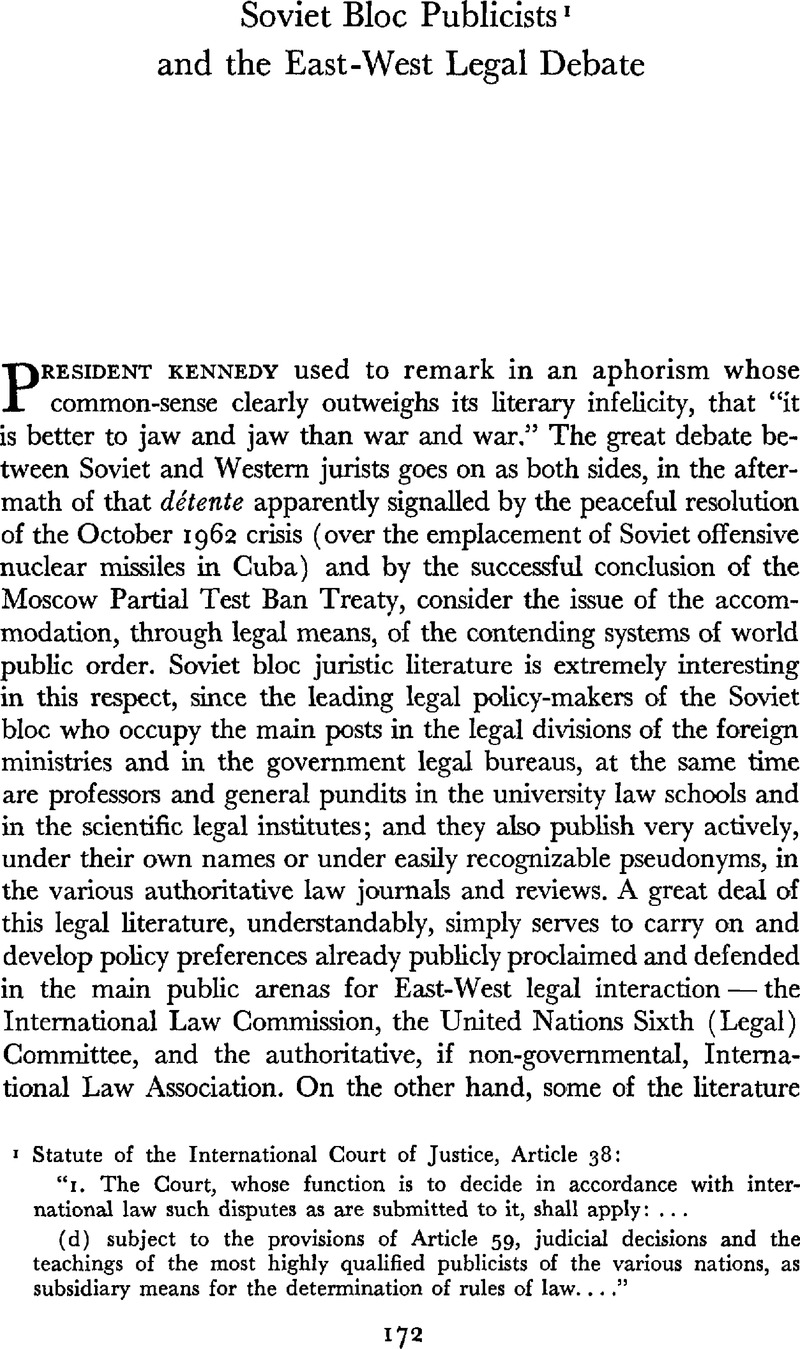No CrossRef data available.
Article contents
Soviet Bloc Publicists1 and the East-West Legal Debate
Published online by Cambridge University Press: 09 March 2016
Abstract

- Type
- Notes and Comments
- Information
- Canadian Yearbook of International Law/Annuaire canadien de droit international , Volume 2 , 1964 , pp. 172 - 183
- Copyright
- Copyright © The Canadian Council on International Law / Conseil Canadien de Droit International, representing the Board of Editors, Canadian Yearbook of International Law / Comité de Rédaction, Annuaire Canadien de Droit International 1964
Footnotes
Statute of the International Court of Justice, Article 38:
- “i. The Court, whose function is to decide in accordance with international law such disputes as are submitted to it, shall apply:…
- (d) subject to the provisions of Article 59, judicial decisions and the teachings of the most highly qualified publicists of the various nations, as subsidiary means for the determination of rules of law. …”
References
2 Pechota, V., “Vaine Shromazdeni OSN a Projednavani Pravnich Zasad Mirovehi Souziti,” 7 Casopis pro Mezinarodni Pravo 97 (1963).Google Scholar
3 McWhinney, E., “Soviet and Western International Law and the Cold War in the Era of Bipolarity,” I Canadian Yearbook of International Law 40, 58–9 (University of British Columbia, 1963).Google Scholar
4 Tunkin, G.I., Voprosi Teorii Mezhdunarodnogo Prava 121 et seq. (1962.Google Scholar
5 Lachs, M., 18 Panstwo i Prawo 207 (1963).Google Scholar
6 Statement by the representative of Poland, Professor Manfred Lachs, delivered in the Sixth Committee of the General Assembly, United Nations, November 14, 1963. (Polish People’s Republic Permanent Mission to the United Nations, New York).
7 Magarasevic, A., “Metodoloska pitanja nauke i nastave medunarodnog javnog prava i medunarodnih odnosa,” 10 Jugoslovenska Revija za Medunarodno Pravo 7 (1963).Google Scholar
8 Tunkin, G.I., “Printsip Mirnogo Sosyshchestvovaniya — Generalnaya Liniya Vneshnepoliticheskoi Deyatelnosti KPSS i Sovetskogo Gosudarstva,” [1963] Sovetskoe Gosudarstvo i Pravo 26, 35.Google Scholar
9 Responding in particular to my article, “‘Peaceful Coexistence’ and Soviet-Western International Law,” 56 American Journal of International Law 951 (1962).
10 Published in [1964] Revue Générale de Droit International Public 310.
11 The statement is signed, in addition to Professor Korovin and Judge Kozhevnikov, by Professor M. Lazarev, Professor V. Lissowsky, Professor V. Shurshalov, I. Blishchenko, Professor N. Minossian, and V. Menzhinsky.
12 McWhinney, E., “Le concept soviétique de ‘coexistence pacifique’ et les rapports juridiques entre l’U.R.S.S. et les États occidentaux,” [1963] Revue Générale de Droit International Public 545.Google Scholar
13 See Report of the Forty-Seventh Conference, International Law Association, Dubrovnik, 1956, at 17–63 (1957), (Coexistence, especially the address by Professor Milan Bartos of Yugoslavia).
14 [1964] Revue Générale de Droit International Public 310, 311.
15 Korovin, E.A., “International Law Today,” International Affairs (Moscow), (July 1961), at 19.Google Scholar
16 Korovin, , Vestnik Moskovskogo Universiteta (August 1961) at 64 et seq.Google Scholar
17 Tunkin, G.I., “Coexistence and International Law,” 95 Hague Recueil 1 (1958).Google Scholar
18 See, in this regard, the remarks by Professor Tunkin as to Professor Korovin’s views, in 95 Hague Recueil 1, 60 (1958).
19 [1964] Revue Générale de Droit International Public 310, 312.
20 The reference by the Soviet jurists is apparently to my discussion in [1963] Revue Générale de Droit International Public 545, 551.
21 See generally my discussion, “Operational Methodology and Philosophy for Accommodation of the Contending Systems of International Law,” 50 Virginia Law Review 36 (1964); and see also my forthcoming book, Peaceful Coexistence (1964).




